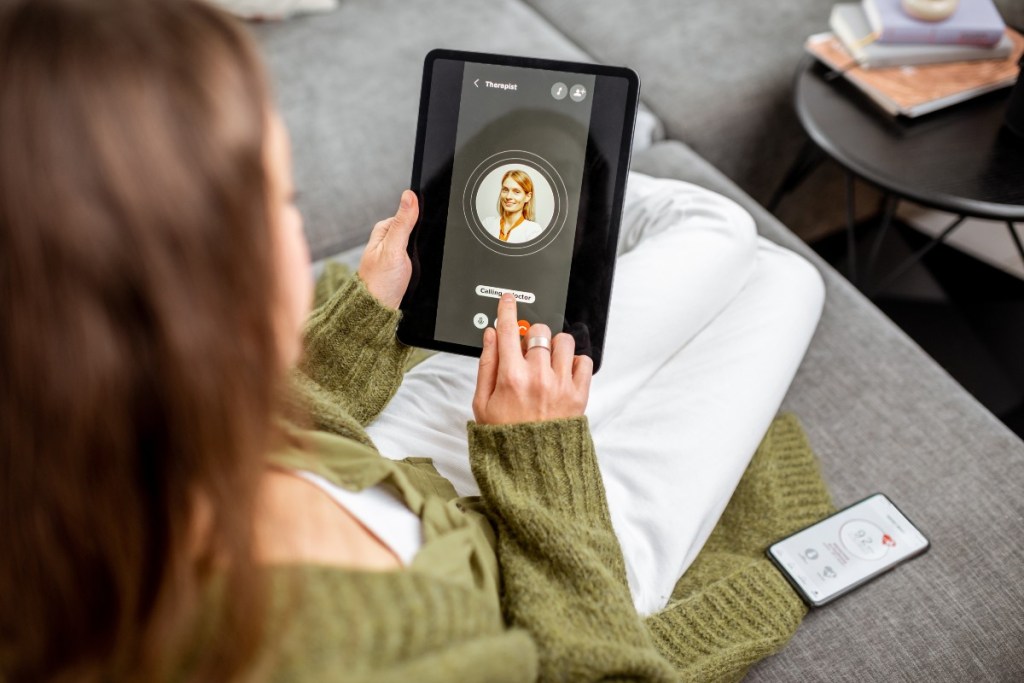If you’re feeling down or struggling with a mental illness, know you’re not alone. One in five adults reported experiencing mental illness in 2019, according to the National Alliance on Mental Illness. Help is available if you just know where to look. Therapists and support groups can help people feel less alone and work on any issues they are facing and many organizations may even provide online services.
If you have health insurance, your provider can give you a list of in-network resources so you can call the person or facility, schedule an appointment, and determine if they’re the right fit. But not everyone has insurance — and even if they do, not all insurance covers mental health services. If this describes you, you may be wondering, “Can I receive mental health help with no insurance?”
In a word, yes. Some therapists provide mental health help, no insurance required, and there are also a plethora of free mental help resources both in-person and online.

Why do some people choose not to use insurance for mental health help?
Some people don’t have health insurance. Perhaps they lost their job or don’t receive insurance through their employer because they do not work full-time. Other people may not be able to afford the expensive co-pays. In this case, the best approach is to speak with a therapist or use an app that does not require insurance to join. Instead, these services often use a membership model, asking members to pay the provider or app directly instead of an insurance company. Paying out of pocket for any healthcare service can be expensive, so be sure to do your research and find a provider and rate that works best for you.
What does therapy cost?
An appointment with a mental health professional generally costs between $60 and $200 per hour. Factors such as level of experience and education, location, type of therapy, and delivery method (online or in-person) all influence cost. You can research approximate costs in your area by visiting an online therapist directory and researching professionals near you.
I lost my insurance, but I want to keep my therapist. What should I do?
Perhaps you’ve established a good rapport with your therapist, then, for whatever reason, you lose your insurance. Or, perhaps your insurance changed, and the therapist is no longer in-network. You may be able to continue to see this therapist and receive mental health help without using an insurance plan. Talk to your mental health provider about your payment concerns. They may allow you to pay them on a sliding scale, a reduced rate based on your income. Additionally, they can recommend other providers for you that are in-network or less expensive out of pocket.
Are there risks to getting mental health help without insurance?
The biggest risk to getting mental health help with no insurance is the cost. Car insurance, for example, helps offset costs if you get into an accident. Health insurance does the same if you need treatment, including for mental health. Sometimes, it’s worth the investment to pay a set amount every month as opposed to a large fee with each appointment. However, insurance can be very expensive and complicated to navigate, and membership-based therapy apps like Talkspace may be more affordable options.

Where can I find mental health help if I have no insurance?
Psychology Today is another free mental health resource that provides lists of providers in your area. Call or email their offices, tell them you need help finding mental health help without insurance. These professionals know the ins and outs of finding a mental health professional that fits all of your needs, including financial ones.
Apps, such as BetterHelp, also offer listings of therapists who do not require insurance. You can browse their profiles and find one you’d like to speak to.
University hospitals often offer programs where patients can see interns and residents on a sliding scale. There are also non-profit options such as Open Path Psychotherapy Collective that help connect low- and middle-income patients with care at very reduced rates.
What are free mental health resources?
If you’re unable to spend money at this time, you can still utilize free mental health resources. Many organizations have helplines staffed by trained professionals such as NAMI, National Eating Disorders Association, and the National Suicide Prevention Lifeline.
Several support groups serve as free mental help resources, so if you want to connect with others with similar experiences, check out SMART Recovery and The Tribe. If you have questions or need more specific advice, speak with your primary care doctor at your next appointment or search the listings of your local hospital.
Mental help should not be a luxury, but for some people, insurance is. If you need mental health help and have no insurance, do not despair. You may be able to see a therapist and create a payment plan or find a professional to speak to online through an app. Keep in mind that friends, family, helplines, and your doctor can all provide you with referrals to get the mental health help you need. Above all, remember: When in doubt, reach out.
BlissMark provides information regarding health, wellness, and beauty. The information within this article is not intended to be medical advice. Before starting any diet or exercise routine, consult your physician. If you don’t have a primary care physician, the United States Health & Human Services department has a free online tool that can help you locate a clinic in your area. We are not medical professionals, have not verified or vetted any programs, and in no way intend our content to be anything more than informative and inspiring.



